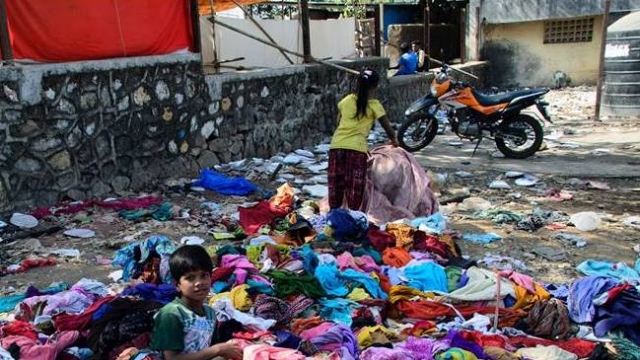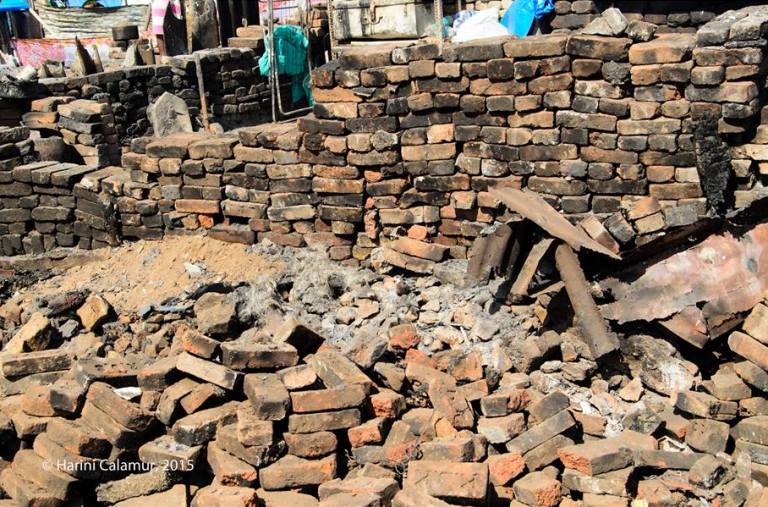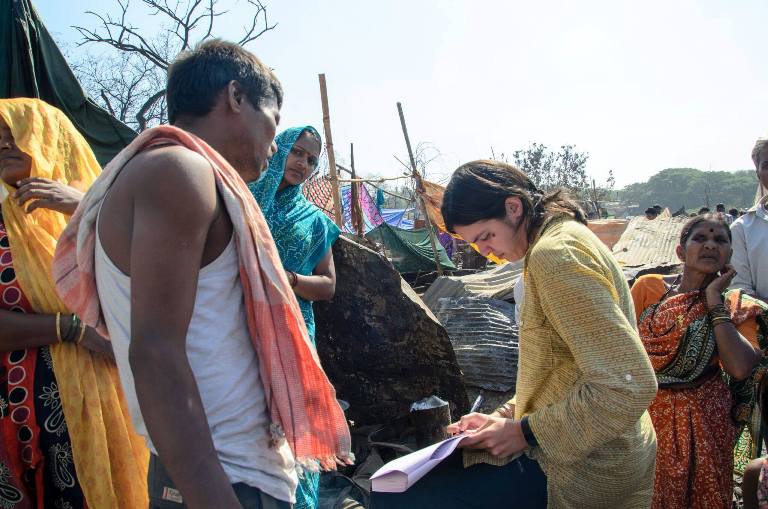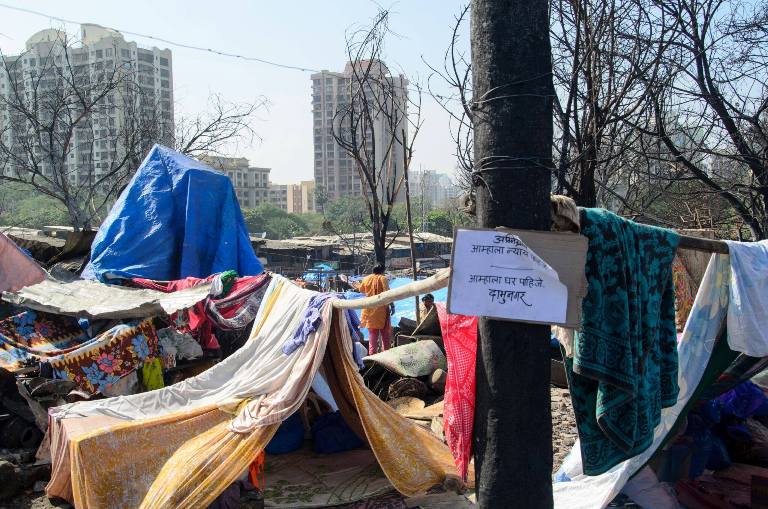Children sift through a pile of clothes strewn on the ground.

(Harini Calamur)
Conversations and observations from what I saw at Ground Zero.
Did you donate for the people affected during the Chennai floods earlier this month? Or contribute anything for victims of thein Mumbai's Kandivali this week? If you didn’t already, take a pause and read this before you decide what to do. If you already did, I beg your pardon if any of my thoughts offend you.
On Saturday morning, several colleagues and I visited Damu Nagar, where a sudden fire had completely ravaged a huge slum in Kandivali East, a western suburb of Mumbai, a few days ago. Our intention was to see if we could help the local schoolchildren with textbooks, school uniforms and other materials.
I am going to dispassionately narrate the conversations I had and my observations of what I saw at Ground Zero.
First and foremost, most of the people of Damu Nagar, if not all, have lost their dignity. The fire lasted only 30 minutes, but has probably changed their lives forever. The fire started out of nowhere, spread quickly, and gutted almost everything that these 1000 families had. It is indeed a miracle that only two died in the fire and not several hundred. The shanties were so close, a person could barely have manoeuvred through those narrow alleys. Cooking gas cylinders exploded one after another and before they knew it, they had become much poorer than they were.
So should they celebrate the fact that they are alive?

Charred remains of a house gutted in the fire. Photo credit: Harini Calamur
When we reached the site, the first scene that greeted us was a heap of clothes in a big open space and kids sifting through them to figure out what fit them and what was good enough to wear. It struck us that the clothes were actually not so good and have been given away with the notion of having contributed to the society. I am willing to say that the donors genuinely believed in charity.
It was only when we went up and spoke to people that we realised how wrong we usually are in such situations. A woman was extremely angry at most of us and said that people were coming there, literally trampling through the area, clicking pictures for publicity and surveying their ruins. I was disturbed and went up to her and explained that help was not possible unless we went around and saw what was needed. And then came the eye-opener. “Look at this utensil… will you give this to your maid?” the lady asked me, holding a rusted iron frying pan up. “You want us to cook food for our children in this? Will you do it for your kids? Then why us?” she asked us scathingly. Next, she held up a five-millilitre coconut oil pouch and asked if this oil was enough for her own hair, let alone her three daughters. “You call this help?” she asked. Another lady stomped up to us with rice in her hand. “This is sold at the PDS shops for Rs 2 per kg. This has been given to us in the name of relief. These grains are not fit for consumption. Why are they being thrown at us? Our kids eat much better rice,” she told us.

A volunteer conducts a survey of the area. Photo credit: Harini Calamur
As we moved around, we saw how some makeshift shanties had managed to corner a large volume of aid that flowed in to Damu Nagar. People were roaming around with food, clothes, blankets, and kids were running after them as their parents had asked them to. Some were complaining how aid had reached only certain pockets in the basti while others were left high and dry. An elderly man shot back at those complaining. “Don’t say you didn’t get any. You can say you got less while others got more. But be thousand times grateful to these rich people who are helping us without any word. You think they are doing this for getting a name? They are so noble, and you are insulting them by complaining,” he scolded a youngster. I felt sick from the inside. So we are great and noble because we are offering our worn-out clothes and Rs 2 per kg rice to ‘these poor things’?

A woman talks about the losses she suffered in the fire. Photo credit: Harini Calamur
What we saw around lunchtime, was more disheartening. Someone had brought 50-gram packets of farsan and there was a long queue to get that. There was another queue for what seemed like khichadi . And yet another for what seemed like something between a pulav and a biryani (vegetarian of course). “For the last five days we are getting dal, rice and papad for meals,” a woman told us.
The biggest concern for the people of Damu Nagar today is if they are going to get a roof back on their heads. The entire slum was illegal, an encroachment on the Forest department land. The government condoned it (of course with a few officials getting their share of pie), but won’t allow them to rebuild their house, let alone offer them a rehabilitation package. They have beenper family which will at best take care of a month’s basic groceries and nothing more. But it’s not the money they want. They have lost their homes. No one can tell them today if they will get them back.

"We want justice, we want houses", a small poster the area reads. Photo Credit: Harini Calamur
Over and above this, what I felt at Damu Nagar was that there was really more than enough relief material for the affected. There were literally hundreds of volunteers running around helping people and it was great to see that our humanity wasn't dead after all. However, there is a complete lack of coordination in the distribution of the relief material. Several organisations have set up their own tents and are working relentless, but their work would mean much more if they worked together. A tehsildar level officerand what people need and then distribute it accordingly is sorely needed. But there is none. This is possible only when a senior minister or bureaucrat comes to Damu Nagar.
Read: Volunteers face a tough time, recall victims fighting to snatch food packets
Another thing to ponder about is, how does it reflect on us when we give away old, tattered clothes, absolutely inferior quality utensils and food grains? One is reminded of that beautiful legend from Mahabharata where Arjun asks Lord Krishna why people praised Karna and did not have such high praise for him or others. Lord Krishna decided to show him the difference by example and said he would turn a small hillock into gold and then he can donate that to the villagers. Arjun was thrilled and called the people to the gold hillock to collect from him a small share of the precious metal. Lord Krishna offered the same to Karna. In contrast, all he did was call someone from the village, direct them to the gold treasure, and walk away.
What we need at Damunagar and in Chennai is several Karnas who will work selflessly. We are mostly Arjuns, gloating in the so-called charity we offer, craving to hear our own 'wah wah'.